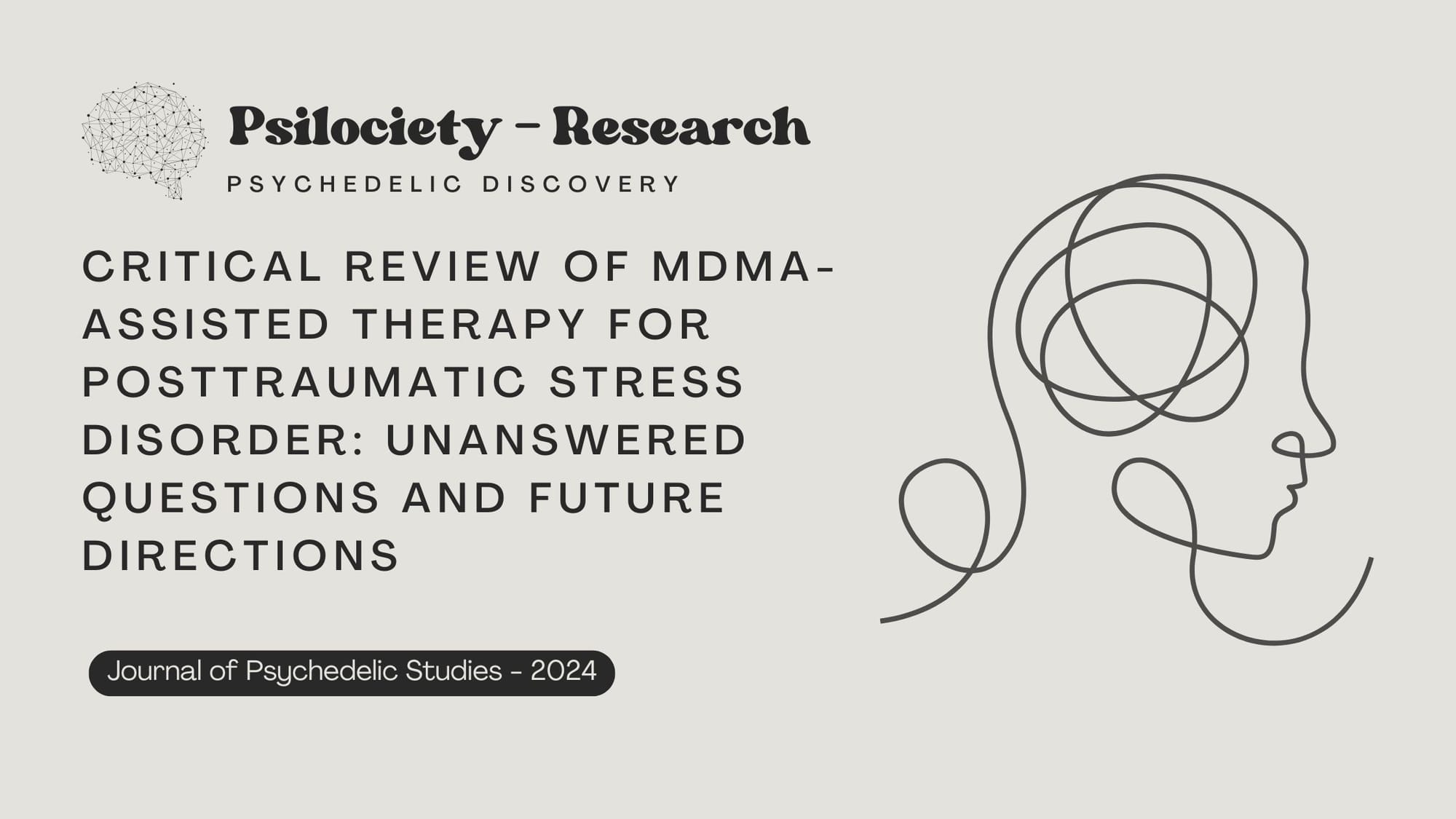Critical Review of 3,4-Methylenedioxymethamphetamine (MDMA)-Assisted Therapy for Posttraumatic Stress Disorder: Unanswered Questions and Future Directions
This study critically reviews randomized controlled trials (RCTs) of MDMA-assisted therapy (MDMA-AT) for PTSD, focusing on efficacy, methodological issues, and future research directions.

Title & Introduction
- Paper Title: Critical Review of 3,4-Methylenedioxymethamphetamine (MDMA)-Assisted Therapy for Posttraumatic Stress Disorder: Unanswered Questions and Future Directions
- Published In: Journal of Psychedelic Studies, 2024
- Authors: Alex P. Hood, Chris E. Corlett, Cameron T. Alldredge, Gary R. Elkins
- Objective/Research Question: This study critically reviews randomized controlled trials (RCTs) of MDMA-assisted therapy (MDMA-AT) for PTSD, focusing on efficacy, methodological issues, and future research directions.
- Importance: MDMA-AT is a novel approach gaining significant attention for PTSD treatment. Understanding its potential and limitations is crucial as it moves toward wider clinical and regulatory adoption.
Key Background Information
- Context: PTSD is a debilitating condition affecting 5% of U.S. adults annually, associated with significant economic and social costs. Current treatments, like Cognitive Behavioral Therapy and SSRIs, show high dropout and non-response rates.
- Hypothesis: MDMA-AT may improve PTSD outcomes by facilitating emotional processing and fear memory modulation when combined with non-directive therapy.
Methodology
- Study Design: A critical review of six eligible RCTs, including four Phase II and two Phase III trials.
- Participants: Primarily chronic PTSD sufferers with treatment resistance, predominantly White and female in reviewed samples.
- Intervention/Exposure: MDMA administered alongside psychotherapy in doses ranging from 80-180 mg, typically over several sessions.
- Controls: Comparisons involved placebo or low-dose MDMA; none included direct comparison to standard PTSD treatments.
- Duration: Studies ranged from weeks to follow-ups of one year.
Key Findings
- Primary Outcomes:
- Five out of six trials showed significant PTSD symptom reduction on the Clinician-Administered PTSD Scale (CAPS).
- Effect sizes ranged from moderate to large.
- Secondary Outcomes:
- Improved scores on related scales for depression, disability, and sleep quality in some studies.
- Safety Profile: Few serious adverse events, though MDMA was less safe for individuals with cardiovascular risks.
Interpretation & Implications
- Conclusion: While promising, MDMA-AT studies lack comparison to existing therapies, suffer from poor blinding, and rely heavily on a single sponsor (MAPS), raising concerns about bias.
- Implications: Wider clinical adoption is premature without further research to establish comparative efficacy and clarify critical treatment components.
- Limitations: High costs, extensive therapy duration, and methodological concerns (e.g., poor blinding, self-selection bias) restrict its generalizability and accessibility.
Quotes & Expert Opinions
- Author's Quote: “Future trials must address comparative efficacy and refine MDMA-AT to improve accessibility.”
- Expert Commentary: The American Psychiatric Association has urged caution due to insufficient evidence.
Summary & Takeaways
- Key Takeaway: MDMA-AT shows potential for PTSD treatment but requires rigorous comparative trials and cost reductions for broader adoption.
- Practical Application: If proven effective, MDMA-AT could complement existing PTSD treatments, particularly for treatment-resistant cases.
Researchers & Publication
- Authors: Alex P. Hood, Chris E. Corlett, Cameron T. Alldredge, Gary R. Elkins
- Publication: Journal of Psychedelic Studies, 2024
- Study URL: https://doi.org/10.1556/2054.2024.00383

